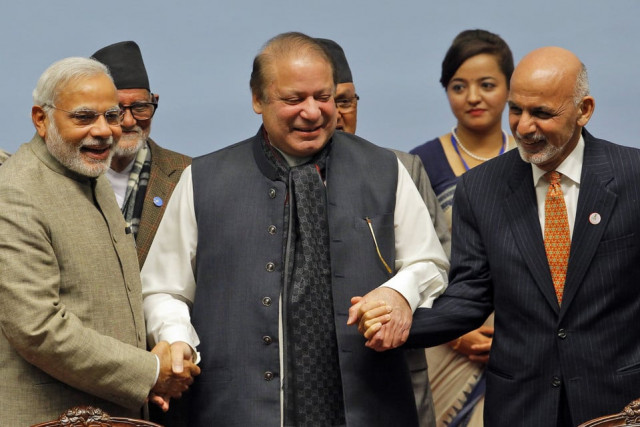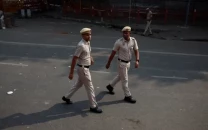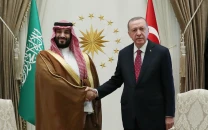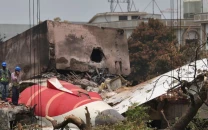Indo-Afghan ‘historical’ relations: where does Pakistan fit?
For regional relations, Afghanistan should act realistically considering its location, strengths and weaknesses.

A file photo of Prime Minister Nawaz Sharif, Indian Prime Minister Narendra Modi and Afghanistan President Ashraf Ghani during 18th SAARC meeting in Nepal. PHOTO: REUTERS
No end to terrorism without better Pakistan-Afghanistan-India ties
Misperception, misrepresentation
To begin with, Afghanistan and India do not share a common border; Pakistan lies between them. When it comes to Pakistan, Afghans believe that there was no such thing as Pakistan prior to 1947 and that it was carved out of British India. The statement would be true if you looked at Pakistan as a state. However, the geography and people of present-day Pakistan have existed as long a history as those of India and Afghanistan. The 5,000-year-old Bronze Age Indus Valley Civilisation that extended to parts of Afghanistan and India was mainly centred in present-day Pakistan. As a matter of fact, it was the territory and people of present-day Pakistan that made any interaction between present-day Afghanistan and present-day India possible.
To clarify, the application of the concept of the nation-state is relatively new, especially in our part of the world. Prior to that, political boundaries would shift depending on how much power, or lack thereof, a ruler had. In the case of Afghanistan, the current Afghan nation-state came into being in the 1890s, after most of its borders were demarcated (at least on paper) by the British and Russians.
Pakistan-Afghan relations strained due to Indian influence: Khawaja Asif
As such, any discussion of the historical relationship between India and Afghanistan, prior to 1947, would automatically drag in Pakistan. It was through present-day Pakistan that for centuries armies had marched from Afghanistan and beyond into India, or the other way around. In Sir Olaf Caroe’s words:
“It is interesting that the ‘India’ of Herodotus, and indeed of Alexander and the Greeks and Romans generally, was a part of what we now know as the Panjab and Sind. It was the valley of the Indus, and geographically comparable with… Pakistan of today... In a setting of ancient history, Pakistan has thus a better claim to be known as India than has the Bharat of post-partition days since 1947. Darius, Herodotus, Alexander, Pompey, Horace, Trajan, would certainly have thought of India in the geographical terms of what is now…Pakistan.”
Moving forward
It is not merely of historical importance to consider Pakistan when it comes to Indo-Afghan relations. Afghanistan should exercise caution and honesty when handling both India and Pakistan. The unnecessarily close Indo-Afghan relations have bothered the civilian and military leadership in Pakistan. Even worse, the Indo-Afghan relationship is beginning to turn Pakistani public opinion anti-Afghanistan, which in turn would further deepen the growing Afghan-Pakistan divide. Let’s keep in mind that for decades it’s been due to favourable Pakistani public opinion toward Afghanistan that Afghans have lived, worked, and studied with relative peace - without even having legal documents on them - in Pakistan. Rarely would you find such an example in the history of our modern world?
India’s efforts to divide Afghanistan and Pakistan will not go very far: Sartaj
We must also be mindful of the fact that it is Afghanistan and Pakistan that share 2,430-kilometre long border, religion, and culture, and that it’s Pakistan with whom Afghanistan actually has had a longer historical relationship. For instance, there are around 50 million people living on either side of the Afghan-Pakistan border who belong to the same ethnic group and speak the same language. It might also come as a surprise to many of my fellow Afghans to learn that the father of modern Afghanistan, Ahmad Shah Durrani (also known as Abdali), is believed to have been born in Multan and not the official birthplace, Herat. Is Multan in present-day Pakistan or in present-day India?
While Afghanistan, as a sovereign state, has every right to befriend whoever it wants, it should act realistically, considering its location, and strengths and weaknesses. Afghanistan's being realistically considerate of Pakistan's importance would help mitigate the growing anti-Afghanistan sentiments in Pakistan as well as alleviate part of the Pakistani leadership's concerns. When Afghanistan expects Pakistan to play a meaningful role in restoring peace and stability in Afghanistan, Afghanistan should also act responsibly and realistically.
Arwin Rahi was an adviser to the governor of Parwan in Afghanistan from 2012 to 2013. He has a master’s degree in politics and security studies with a focus on Central Asia and Afghanistan from the OSCE Academy in Bishkek, and another master’s in international affairs from the Bush School of Government and Public Service in Texas. He can be reached at rahiarwin@gmail.com



















COMMENTS
Comments are moderated and generally will be posted if they are on-topic and not abusive.
For more information, please see our Comments FAQ